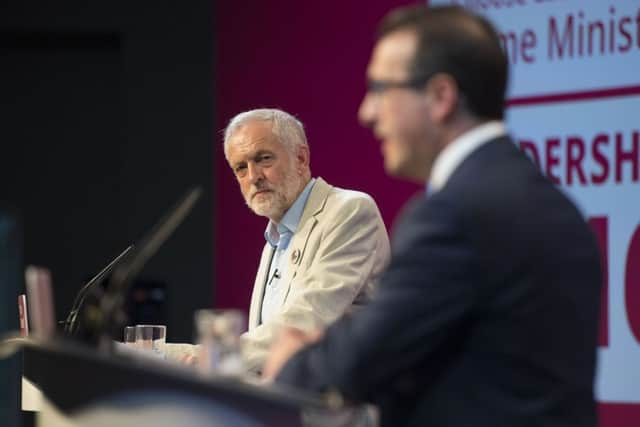Labour Party attacked for '˜undermining democracy'


At the Court of Appeal, Labour’s national executive committee (NEC) won its bid to overturn a High Court decision that had paved the way for about 130,000 supporters who signed up from January to take part in the contest.
Many of the members affected are believed to back Mr Corbyn rather than his rival Owen Smith.
Advertisement
Hide AdAdvertisement
Hide AdThe Labour leader’s campaign chairman John McDonnell accused the NEC of using a “grubby little device” to overturn the original decision.
The shadow chancellor said: “I just find it shaming for a democratic party like ours, with a tradition over a century of campaigning for democracy throughout our society.
“We are now undermining the democracy of our own party. They used a grubby little device.”
Mr Corbyn’s campaign team said the ruling was “the wrong decision – both legally and democratically”.
The five new members who the High Court ruled on Monday were unlawfully “frozen out” of the leadership battle have been refused permission to appeal to the Supreme Court but can still ask its justices directly to consider their case.
David Goldstone QC, who had represented the five, indicated in court that steps had already been taken which could lead to a hearing on Tuesday.
The five members brought their case after the NEC decided that full members would not be able to vote unless they had at least six months’ continuous membership from January 12 up to July 12 – the “freeze date”.
All five have now been ordered to pay £30,000 towards the NEC’s costs within 28 days.
Advertisement
Hide AdAdvertisement
Hide AdA spokesman for Mr Corbyn’s campaign team last night said: “The court’s ruling disenfranchises nearly 130,000 Labour members, who have joined the party since January and were explicitly told that they would have a vote in any leadership election.” Meanwhile, leadership challenger Owen Smith said the ruling “doesn’t change my approach to this contest”, saying he would continue to make his case as to why he should become Labour’s new leader.
He said: “I had welcomed the prospect of 125,000 additional members being given the opportunity to vote in this vitally important leadership election.
“I don’t think it changes anything for me. I’m just going to carry on getting around the country talking to members, old and new members, and trying to persuade them that the crisis that I see in the country and the crisis that I see in the Labour Party, we’ve got to solve them both.”
Iain McNicol, the party’s general secretary, led the appeal against the High Court’s original decision. Announcing the Court of Appeal’s decision yesterday ,Lord Justice Beatson, sitting with Lady Justice Macur and Lord Justice Sales, said: “On the correct interpretation of the party rules, the National Executive Committee has the power to set the criteria for members to be eligible to vote in the leadership election in the way that it did.”
Mr Corbyn’s team said Labour’s lawyers had “invoked an obscure clause” in the party’s rule book that “could be read as giving the NEC the right to ignore all of the rules laid out”.
A spokesman said: “In other words, this is a ‘make it up as you go along’ rule. We do not think that making it up as you go along is a reasonable way to conduct democracy in our party. Serious questions must be raised, however, over why and how the NEC procedures committee brought this appeal. In doing so, it effectively risked new members’ money on an attempt to disenfranchise them.”
NEC chairman Paddy Lillis insisted the party had been right to launch an appeal, claiming it would have appealed against the High Court if it had ruled against the body’s decision that Mr Corbyn should automatically be on the ballot paper for the leadership contest in a previous case.
“The original court decision had wide-ranging implications for the party and the authority of our governing body,” Mr Lillis said. It was the correct decision to seek clarification on this fundamental principle in the Court of Appeal.”
Advertisement
Hide AdAdvertisement
Hide AdLawyers for the five – Christine Evangelou, the Rev Edward Leir, Hannah Fordham, Chris Granger and “FM”, a teenage member – had argued that the NEC had no power under the rules to retrospectively freeze a full member’s ability to vote in leadership elections.
Mr Leir described the ruling as a “hugely disappointing result” for him and the 130,000 other party members now excluded from voting.
The result of the leadership battle is due to be announced on 24 September at a conference in Liverpool. Labour’s NEC had previously decided by 18 votes to 14 that Mr Corbyn should be automatically included on the ballot in Labour’s leadership contest meaning he did not need to secure MPs’ backing.
Labour donor and former parliamentary candidate Michael Foster launched a legal challenge to the party’s ruling putting Mr Corbyn automatically on the ballot but it was rejected by the judge.
The only time since 1945 that a sitting Labour leader has been challenged was in 1988 when Tony Benn sought to topple Neil Kinnock.